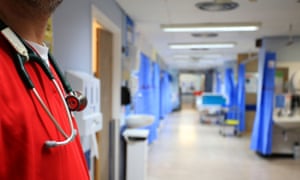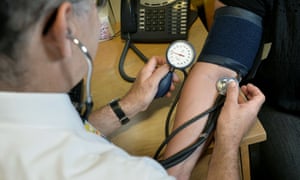Some 57,000 Europeans are employed by the NHS, and their position has looked increasingly uncertain since Britain voted to leave the EU. It’s an issue highlighted by the Institute of Public Policy Research, with the thinktank warning that the health service could collapse if those European workers left the UK. Chris Murray, who compiled the report, said: “It is critical to public health that these workers do not seek jobs elsewhere. All EU nationals who work for the NHS, or as locums in the NHS system, should be eligible to apply for British citizenship.”
So, how do European nationals working for our health service feel post-Brexit? Six of them explain.
Spanish pharmacist
Ricardo, 38, Bournemouth: ‘I am not sure how the NHS will cope without Europeans’
After Brexit, me and my wife started thinking of places to go: Spain, Scotland, Canada. My wife is Scottish and works in academia, so we need to find somewhere we could both work. I feel betrayed by the referendum vote, and in some ways it looks like we are going to be allowed to stay for as long as we are useful. This country has decided to shut its doors to globalisation – despite the fact that it’s here to stay.
In my department, more than 50% of the pharmacists come from the EU
I know not everyone voted for Britain to leave the EU because of immigration, but it played a huge part for a lot of people. It makes me feel unwelcome, but I like my life here: I have a great job and met my wife in Britain. My future here now seems very uncertain, which is a shame because Europeans are very important to the NHS. Just to give you an example: in my department more than 50% of the pharmacists come from the EU. Likewise, most hospitals have hired (or are hiring) nurses from Europe. I am not sure how the NHS will cope without us.
Nurse from the Netherlands
Helena, 52, Wales: ‘The way I feel now I am not sure I would even accept British citizenship’
It has now been around two months since Brexit. At the moment I still feel like I am going through the five stages of grief: denial, anger, bargaining, depression and acceptance. Why should I have to apply for dual nationality and pay thousands to do so? I feel as though the goal posts have been shifted and I can no longer remain here on the same terms on which I arrived from the Netherlands in 1995. To be honest, the way I feel now I am not sure I would even accept British citizenship if offered it. I do not really feel welcome in the UK any more, and I am not sure if I will stay or go.

Shortly after the referendum result was announced my husband got a letter from the university where he works to say they would support EU-citizen-staff and family members who wanted to get permanent citizenship. I have not yet heard anything from my employer, despite being an NHS nurse for more than 14 years. Maybe EU nationals are not important, but this is surprising given the high number who work here. I know that without us the NHS would be unsustainable. There is no budget, investments and slack in the NHS to grow, develop and modernise. A few weeks ago, when I was back in the Netherlands, I had to accompany a family member to hospital and the healthcare service was so much better. It feels tempting to go back home.
Quality improvement officer from Germany
Chuck, 52, London: ‘With 20 years of experience in the NHS, I have a lot to offer this country’
With 30 years of healthcare experience (20 of it in the NHS) I have a lot to offer this country. But I am one of many. We have nurses, doctors and therapists from all countries. Clinical innovation, for example, seems to be supported by high numbers of academic clinicians from Greece, Spain and Italy.
Even if we are being made to feel welcome at work, I no longer feel that welcome on on the streets
I am a German expat and have been living in Britain for the past two decades because I like the country, the people, the culture and the NHS. NHS executives have been very supportive and sent messages saying that European colleagues are valued, needed and welcome here. However, the government’s position is not clear, and my wife and I worry about changes in the public mood. Even if we are being made to feel welcome at work, we no longer feel that welcome on the streets. Because of this, we are thinking about leaving Britain. The referendum was the most painful reminder that I don’t have a vote in the country I live in and contribute to.
Doctor from Germany
Stephanie, 42, Portsmouth: ‘The UK can’t afford to loose more committed staff members’
I am in the process of applying for a permanent residency card, which I require if I want to apply for naturalisation (the legal act by which a non-citizen in a country may acquire citizenship). However, currently the German government only allows dual citizenship if the other country is an EU country, and I don’t want to give up my German passport – hopefully I can sort it out before Article 50 is triggered. The whole process is so complex and expensive, however, almost as though it’s designed to put people off. I am a German GP and married to a British citizen. My son already has dual nationality and I feel this is my only option.

Although my primary degree is from a German university, I did my postgraduate and general practice training in the UK. There is a shortage of GPs at the moment, and Jeremy Hunt’s plan was to recruit 5,000 from abroad to solve the crisis. It is therefore vital that EU nationals working here as doctors are encouraged to stay. The UK can’t afford to lose more committed staff members.
Cardiologist from Austria
Daniel, 43, Surrey: ‘I feel upset that some of the people I treat want me out of the country’
I am already looking for positions in other European countries. Despite the fact that I love my job, my colleagues and my patients, I do not feel that this is the place for my children to grow up. Their opportunities have been taken from them, and it only looks like things will get worse.
EU nationals are critical for the NHS. I come from Austria, and many of my fellow doctors come from all over Europe. We rely on nurses from across the EU, who are all highly qualified and motivated to do their work. The UK alone simply does not have enough trained staff to keep up with the needs of its citizens, and there are too few in training programmes. The staffing problems will just get worse.
I feel upset to know that some of the people I treat want me out of “their” country. I feel that they probably call me all sorts of names behind my back. We Europeans should all work together towards a brighter future for the whole world.
Surgeon from Austria
Peter, 35, Liverpool: ‘I will serve the NHS as long as I can’
My plans, post-Brexit, are to continue serving the people of the UK via the NHS as long as the government allows me to. I would not take British citizenship now, however, if offered it. I was eligible for British citizenship 10 years ago, but I have no interest in giving up my own EU citizenship, especially after the referendum. I would not want to limit my access and rights of free movement in the EU. Working conditions in the NHS are in a steady decline, and many EU countries are opening their arms to fully trained doctors and nurses.
- Some names have been changed
From a German doctor to a Dutch nurse: Europeans playing a vital role in the NHS
Hiç yorum yok:
Yorum Gönder